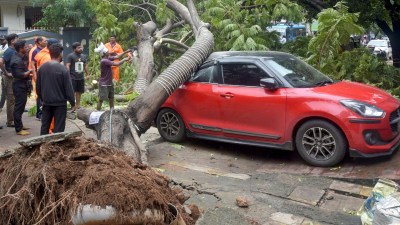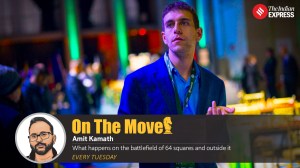Asad Rehman is with the national bureau of The Indian Express and covers politics and policy focusing on religious minorities in India. A journalist for over eight years, Rehman moved to this role after covering Uttar Pradesh for five years for The Indian Express. During his time in Uttar Pradesh, he covered politics, crime, health, and human rights among other issues. He did extensive ground reports and covered the protests against the new citizenship law during which many were killed in the state. During the Covid pandemic, he did extensive ground reporting on the migration of workers from the metropolitan cities to villages in Uttar Pradesh. He has also covered some landmark litigations, including the Babri Masjid-Ram temple case and the ongoing Gyanvapi-Kashi Vishwanath temple dispute. Prior to that, he worked on The Indian Express national desk for three years where he was a copy editor. Rehman studied at La Martiniere, Lucknow and then went on to do a bachelor's degree in History from Ramjas College, Delhi University. He also has a Masters degree from the AJK Mass Communication Research Centre, Jamia Millia Islamia. ... Read More
Zafaryab Jilani: The man who fought ‘Independent India’s most important legal battle’
Attracted towards activism early in life, Jilani got drawn into the AIMPLB and then the Babri Masjid cases, and anchored all of them from the beginning to end, rejecting numerous offers and enticements of public office
 (First row, right to left) Ebrahim Sulaiman Sait, Syed Shahabudding Sb, Mohammad Azam Khan; second row, right to left) Sultan Salauddin Owaisi, and Zafaryab Jilani. (Instagram)
(First row, right to left) Ebrahim Sulaiman Sait, Syed Shahabudding Sb, Mohammad Azam Khan; second row, right to left) Sultan Salauddin Owaisi, and Zafaryab Jilani. (Instagram)
Lawyer, activist, secretary of the All India Muslim Personal Law Board (AIMPLB), convenor of the Babri Masjid Action Committee (BMAC), a leader who never held a political office but sat with India’s tallest politicians – Zafaryab Jilani leaves behind a legacy that will be remembered for a very long time.
Jilani pursued the Ram Janmabhoomi-Babri Masjid case from 1986 till the very end — when the Supreme Court in December 2019 dismissed all petitions seeking review of its November 9 Ayodhya judgment, when it had ruled that the entire disputed land be handed over to a trust to be constituted for the construction of a Ram Temple, and that Muslims be given five acres elsewhere to build a mosque.
The lawyer died at a Lucknow hospital on Wednesday, after prolonged illness followed by a fall in May 2021, during which he suffered brain haemorrhage. He was 73, and is survived by daughter Maria Zafar, sons Najam Zafar, Anas Zafar and wife Azra Zafar.
Inside his two-storey house in Lucknow’s Hussainganj, his office is simple, the walls covered with bookshelves containing neatly arranged legal tomes and some photographs, including of Jilani, the Babri Masjid and others. The windows and switchboards are old and covered in a film of dust.
On Thursday – a day after Jilani’s death – a few lawyers and neighbours gathered to meet the family and express their condolences at the house. Among the first to rush to the hospital after Jilani’s death was former Chief Minister Akhilesh Yadav – under whose government Jilani was an Additional Advocate General.
Akhilesh’s father Mulayam Singh Yadav had close ties with Jilani, and would consult him on legal and religious issues. Among those who made calls to the family after Jilani’s demise were MP Asaduddin Owaisi, whose father Sultan Salahuddin Owaisi had rubbed shoulders with Jilani in their social movements for Muslims, and prominent Sunni cleric Maulana Khalid Rasheed Firangi Mahali.
While the list of people who have worked with Jilani over the years is long, Jilani lived such a simple life that even some of his neighbours didn’t know how well-known he was. Because Jilani left home before most of the colony woke up, neighbours mostly recall seeing him return late from office on his scooter till 2010, and then in his hatchback car.
The death of Jilani, who pursued what is perhaps the most important legal battle in the history of Independent India, will leave a dent in the legal fraternity, said colleagues and peers in Lucknow and Delhi. After his demise, MP Asaduddin Owaisi said Jilani was a friend and colleague of his father and that the loss felt personal to him and his family. “He worked very hard for the Babri case, and as chief of the AIMPLB legal cell. Whenever he would come to Delhi, mostly for the Babri cases, he would stay at my bungalow on 34, Ashoka Road. Since my father’s time, there was a room kept ready for him,” he said.
Jilani was born on February 7, 1950 in Mallihabad – 27 km from Lucknow. While his father Abdul Qayum Jilani was a railway employee and later a zamindar, Zafaryab had grandfathers and uncles who practiced law in pre- and post-Independence India.
Jilani studied till Class X at Mahatma Gandhi Inter College in Mallihabad, and then went to Amiruddaula Islamia Degree College in Lucknow for Class XII in 1963. He then did Bachelors from Lucknow University and completed his LLB and LLM with gold medals from Aligarh Muslim University in 1971.
He then went on to teach at Shia P G College in Lucknow, where he became head of the Law Faculty, but left the job in 1982 to practice.
It was during his time at AMU that Jilani first encountered activism, in 1968, when he became involved in the movement to protect the minority status of AMU. Through the 1970s, he actively took part in the movement and came in contact with Advocate Shafiqur Rahman, a well-known civil lawyer who was leading the movement. Rehman made Jilani co-convenor of the movement to save AMU’s minority status, and also took Jilani under his wing as a junior.
“He rubbed shoulders with national-level secular leaders during the movement to save AMU’s minority character, before Deobandi scholar and former President of the Jamiat Ulema-e-Hind, Asad Madni Sahab, made him (Jilani) his legal advisor in the 1970s,” says brother Masood.
Soon, the leadership of the Darul Uloom Firangi Mahal seminary took note of Jilani’s work in activism and law. “Within no time, he became close to them, especially Maulana Ali Miyan Nadwi” said son Anas Jilani.
He was given a post in the AIMPLB in 1973, when it was constituted. “He held several posts in the Board, and was its secretary when he passed away,” said nephew Zia Jilani, who along with son Najam Zafar, will take over his law practice.
Lawyer M R Shamshad, who worked in the Babri case with Jilani in the Supreme Court, says Jilani was contacted by most politicians who felt the Babri issue was important for Muslims. “He remained in touch with former CMs Mulayam Singh Yadav, Mayawati and then Akhilesh Yadav, as well as senior Congress leaders. He came close to anyone who in some way or the other could sympathise with the issue or work with him on it,” said Shamshad.
Talking of his friend and colleague, senior advocate S F A Naqvi said, “He was among the most soft-spoken and kind-hearted people I knew. There was a grace about him that’s hard to put in words. But his arguments were never soft in court. He had the law on his fingertips.”
Jilani’s most defining moment came in 1982. “A movement for the Ram Temple was started by Vishwa Hindu Parishad leader Ashok Singhal. Firangi Mahal cleric Maulana Nadwi told Zafaryab to lead the legal team in the issue. He gave Zafaryab Rs 3,000 and instructed him to go to Faizabad and start collecting all the papers of the case. From then on, Zafaryab dedicated most of his time to this case,” said Masood.
On February 1, 1986, the locks of the Babri Masjid in Ayodhya were opened. “On February 2, 1986, in a meeting with prominent Muslim leadership from across UP at Lucknow’s Latouche Road, the Babri Masjid Action Committee (BMAC) was formed,” said Masood. Jilani was made convenor of the BMAC along with Azam Khan, while former Congress MP Syed Muzaffar Hussain became its president.
A close friend of Jilani, who wished to remain anonymous, said at different times in the 1980s, Jilani was offered Lok Sabha and Rajya Sabha berths by the Congress, after he represented Sanjay Gandhi in a criminal case. “He refused the Lok Sabha post as he said he didn’t have the money to fight elections. Instead, he proposed the name of another leader, who went on to hold high posts,” said the friend.
Jilani was offered a Rajya Sabha seat by the Congress around 1988, his brother Masood recounts. “Again, he refused because the Congress had put the condition that he couldn’t go beyond the party line in Parliament on the Babri issue. He said he couldn’t give up the most important case facing India’s Muslims for a seat in Parliament,” said Masood.
Asked about the day – December 6, 1992 – when the Babri Masjid was demolished by kar sevaks in Ayodhya, Masood said, “He was in Lucknow and was in touch with Ayodhya locals. He was told by Haji Mehboob (litigant in the Ayodhya case and a member of BMAC) that his house was attacked and that in the riots, 16 people had died. Zafaryab Bhai called the politician he most trusted, former minister Beni Prasad Verma, who agreed to go to Ayodhya with him. Next morning, Verma came to our house and together they traveled to Ayodhya, hoping to recover the bodies of those killed. At Ayodhya Kotwali police station, they were told the bodies had been sent to Raunahi, 25 km away. They went to Raunahi to bury the 16 Muslims who were killed.”
“Afterwards, he was unhappy with what had happened and had decided to pursue the cases against the demolition, as well as the title suit regarding the land, dedicating the rest of his life to it,” said Masood.
Twenty seven years later, in November 2019, Jilani’s “pursuit of justice” didn’t stop even after the Supreme Court had ruled that the disputed land be given to a temple. He remained adamant that a review petition should be filed in the Supreme Court.
His nephew Zia Jilani (28) said, “He was tireless. He would work on cases till 4 am and then be ready by 8 am. Sometimes, I would be embarrassed to see him active and working while I was tired and wanted to go to sleep.”
AIMPLB member and Sunni cleric Maulana Khalid Rasheed Farangi Mahali said after the Supreme Court verdict in 2019, some Board members were against a review petition, but Jilani was adamant. “Jilani Sahab said when he dies and is questioned by the higher powers, he shouldn’t have to answer why the last remedy of justice was not pursued. Hence, we filed the review petition in the Supreme Court, which too was rejected,” said Khalid Rasheed.





- 01
- 02
- 03
- 04
- 05



























